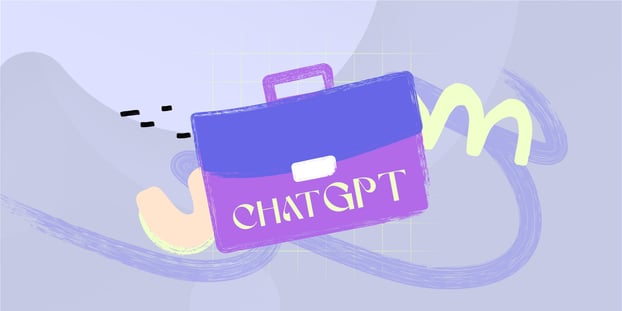Thinking about the impact of artificial intelligence (AI) on the job market, are you on the apocalyptic or utopian side? Maybe something in between? In any case, one point is certain: artificial intelligence is becoming more and more developed. And the question still is, will AI replace jobs?
The launch of ChatGPT has sparked several discussions, including the effect AI will have on employment. In some careers, it can improve efficiency. For example, in the healthcare industry, AI can assist doctors in diagnosing patients by analyzing large amounts of medical data. As a result, healthcare professionals can focus on providing personalized care to their patients.
However, there are also concerns about the potential negative impact of AI on the job market. The matter is that AI could lead to job displacement in specific industries as machines and algorithms replace human workers. So, it's essential to address the challenges and uncertainties it presents, and to help workers prepare for the changes ahead.
Are you wondering if AI will take your job? In this article, we’ll take a look at 20 jobs that are likely to be impacted by AI in the coming years, and explore how they will change.
20 jobs that will change due to AI and ChatGPT
AI is rapidly changing how we live and work, and its impact on the job market is no exception. Get ready to dive into the potential impact of AI on employment.
1. Customer service representative
The AI-powered virtual assistants and chatbots can handle a large volume of customer inquiries and resolve issues faster than human representatives, reducing wait times and improving overall customer satisfaction.
Consequently, human customer service representatives will be able to focus more on situations where the complexity of the inquiry or the customer's emotions require a human touch. Moreover, they will be in charge of tasks that require problem-solving, critical thinking, and creativity skills.
2. Level 1 help desk agents
With the increasing use of AI-powered capabilities, such as InvGate’s AI-powered Response Suggestions, level 1 help desk agents are able to write better and more empathetic responses in seconds, reducing time and allowing them to handle more inquiries efficiently. In addition, artificial intelligence can assist them in categorizing incidents and ticket prioritization.
But even though AI has the ability of enhance agent’s capabilities, many customers still prefer to interact with a human agent, especially when dealing with complex issues or when they are frustrated or upset.
3. Data entry clerk
Using AI in data entry brings numerous advantages, particularly regarding speed. AI algorithms are capable of processing large amounts of information at a rapid pace, far surpassing what a human worker could achieve. In addition to its speed, AI software can detect patterns and trends in data that may not be immediately obvious to human workers, resulting in improved efficiency and decreased errors.
By automating repetitive data entry tasks, AI enables human workers to focus on more strategic, higher-level activities. For instance, instead of spending hours entering data into spreadsheets, workers can use their skills and expertise to analyze the data and make informed decisions based on the results. This shift will lead to higher productivity and efficiency, as workers will be able to concentrate on tasks more aligned with their skill sets and interests.
4. Telemarketing agent
Integrating AI and chatbots in telemarketing will likely shift the functions and responsibilities of agents. With the ability to make automated sales calls, handle lead generation, and conduct market research, AI-powered bots can significantly reduce the need for agents.
However, human telemarketing agents will still play an essential role in the industry, particularly in handling complex sales and building customer relationships.
5. Bookkeeper
We already mentioned how data entry tasks can be automated. In addition, AI systems can improve the accuracy of financial data by reducing human errors and detecting anomalies in real time. Chatbots can also perform fundamental financial analysis and help with compliance tasks such as tax filing.
But while AI and chatbots can automate many routine tasks, human bookkeepers will still play a crucial role in the industry. Their expertise, judgment, and experience will continue to be needed to provide valuable insights and make strategic decisions.
6. Retail sales associate
AI-powered chatbots can handle customer inquiries, such as product information, store hours, and location. They can also track inventory levels and predict future sales patterns. In addition, AI algorithms can analyze customer data and make personalized product recommendations. Finally, chatbots can provide customers with a more seamless and efficient shopping experience, improving customer satisfaction and loyalty.
Despite the potential for AI and chatbots to automate some aspects of the retail sales associate role, human retail sales associates will still play a vital role in the industry. Their interpersonal skills, empathy, and ability to create emotional connections with customers will continue to be highly valued.
7. Paralegal and legal researcher
AI algorithms can review and categorize large volumes of legal documents quickly and precisely, analyze vast amounts of legal data and information, and identify potential issues or inconsistencies. These tasks reduce the time and effort required from human paralegals.
Although AI and chatbots can streamline many tasks, human paralegals will still play an important role. Human skills such as critical thinking, judgment, and a deep understanding of legal principles and practices are difficult for AI systems to replicate. Besides, using AI may also create new job opportunities for paralegals with expertise in AI and technology.
8. News reporter
AI algorithms and models such as ChatGPT or its alternatives can generate news articles, summaries, and reports based on data and other sources of information. In addition, AI-powered tools can help in fact-checking and verifying information, reducing the risk of errors in news reporting. AI systems can also provide real-time news updates and analysis, providing faster access to information for journalists and the general public.
In this way, AI may change how news is gathered, reported, and distributed. Nevertheless, the role of human journalists will still be necessary for areas such as investigative journalism, opinion writing, and providing context and analysis to news events.
9. Insurance underwriter
AI algorithms can quickly analyze vast amounts of data, including customer information, financial data, and historical claims data. AI systems can also help reduce errors and ensure consistent decision-making by removing human biases and using data-driven underwriting criteria. Furthermore, they can handle basic customer inquiries, such as policy information and status updates.
Though AI and chatbots have the potential to speed up specific tasks in the insurance underwriting industry, some complex tasks, such as evaluating the credibility of claims, may still require human judgment and expertise.
10. Receptionist
Receptionists are also susceptible of being impacted by AI, especially in tasks such as:
- Basic phone inquiries, like business hours and directions.
- Appointment scheduling and reminders.
- Providing visitors with information and recommendations.
- Providing visitors with a more seamless and efficient experience, improving customer satisfaction and reducing wait times.
Nevertheless, situations that demand personal interaction and a human touch will still require receptionists. Additionally, they can focus on tasks that require skills and judgment, such as complex problem-solving and critical thinking.
11. Travel agent
As we already established, AI algorithms can analyze vast amounts of data. Based on that analysis, they can make recommendations based on factors such as flight schedules, ticket prices, and customer preferences. Additionally, AI chatbots can also handle routine customer inquiries, such as flight status updates, basic ticketing questions or a list of things to do in Stockholm.
However, despite the technological advancements, certain situations still demand personal interaction and expertise, requiring the services of human travel agents. For example, customers may prefer to speak with a human agent in the case of complex itineraries or to discuss travel options that are not easily searchable or accessible through AI systems.
12. Bank teller
AI-powered systems can handle basic transactions, such as account inquiries and money transfers. They can also analyze customer data and make personalized product recommendations. Moreover, AI and chatbots can enhance the customer's banking experience by making it smoother and more efficient.
Even so, human bank tellers will have significant responsibilities, including resolution of issues with accounts or addressing concerns about financial decisions.
13. Library assistant
Libraries are another area where AI can spice things up. Repetitive tasks such as data entry, cataloging, and classification of books are likely to be done by artificial intelligence in the future. In addition, AI-powered chatbots could provide users with quick and accurate answers to their queries, as well as enhance the user experience by suggesting books based on their interests, or providing information on library hours and services.
Still and all, human library assistants will be in charge of tasks such as assisting with complex research projects and conducting library programs and events.
14. Financial analyst
AI systems can:
- Automate data collection and analysis.
- Use machine learning techniques to build predictive models.
- Analyze market data, historical returns, and other financial metrics to provide investment recommendations and manage portfolios.
- Monitor market trends and analyze financial data to detect and respond to potential risks.
But that doesn’t mean that financial analysts will be replaced. Although AI and chatbots can help automate some of their tasks, they will still require human oversight and interpretation of results.
15. Translation and interpretation services
AI-powered translation tools can quickly and accurately translate text. In addition, chatbots can provide real-time translation and interpretation services, and learn from vast amounts of data – improving their accuracy and ability to recognize and interpret different languages.
However, complex or culturally specific translations and interpretations will still require human expertise.
16. Order processing clerk
Besides automating data entry activities, AI algorithms and chatbots can also be in charge of order tracking and inventory management tasks. Additionally, chatbots can provide real-time customer services (such as answering questions about order status or tracking) and analyze customer data to provide insights into buying patterns and preferences.
Even if chatbots may automate some aspects of the order-processing clerk role, the responsibilities of human clerks will include problem-solving and decision-making tasks.
17. Market research analyst
With AI algorithms’ power to gather, process, and analyze large amounts of data to create predictive models, and their ability to automate the generation of reports and presentations, it’s very likely that they will take over some of the duties of market research analysts.
Nonetheless, the key responsibilities of human market research analysts will be tasks that require creative thinking, critical analysis, and problem-solving skills that AI and chatbots don’t possess.
18. Human Resources Management
AI can automate many routine HR tasks, such as resume screening, scheduling interviews, and onboarding. It can also help talent acquisition by matching job postings with the most qualified candidates. Additionally, AI chatbots can provide employees instant access to HR information, such as benefits and company policies.
But it will not replace HR professionals; it will augment their capabilities and help streamline their workloads instead. The human element remains vital in HR, particularly regarding employee relations, conflict resolution, and decision-making. Therefore, while the role of HR professionals may change due to the integration of AI and chatbots, they will still be crucial in the success of the HR function.
19. Real estate appraisal and property management
Integrating AI and chatbots into the real estate market can automate various tasks, such as data entry, market analysis, and property inspections. AI systems can also provide real-time insights into market trends, property values, and rental rates. Additionally, chatbots can serve as virtual property managers, handling basic tenant inquiries and maintenance requests, which improves the overall tenant experience.
These advancements in AI and chatbots can lead to increased efficiency, reduced errors, and improved customer satisfaction in the real estate appraisal and property management industries. This way, human workers will take on more complex, higher-level tasks requiring human judgment, creativity, and emotional intelligence.
20. Survey researcher
Even though AI and chatbots can take over data collection, data entry, and data analysis, as well as help process and analyze large amounts of information quickly, they will only be performing some of the tasks assigned to survey researchers.
AI integration in this area has the potential to lead to more accurate and comprehensive insights. Additionally, AI-powered chatbots can interact with survey participants, increasing response rates and providing real-time feedback.
The use of AI and chatbots in survey research will likely lead to a change in the skills required for the job, as survey researchers will need to develop new skills, such as working with AI tools and understanding the limitations and biases of AI algorithms. Moreover, survey researchers will need their human expertise, creativity, and critical thinking to design and interpret surveys and analyze the results.
The bottom line
Artificial intelligence and chatbots like ChatGPT have the potential to impact a wide range of job functions and industries significantly. From data entry to customer service and beyond, these technologies can automate routine tasks, freeing workers to focus on more strategic and high-level work.
While AI may alter some jobs, the technology also presents an opportunity to enhance efficiency, productivity, and customer experience. Workers and organizations must stay informed about the changes and embrace new technologies to remain competitive in a rapidly evolving job market.















